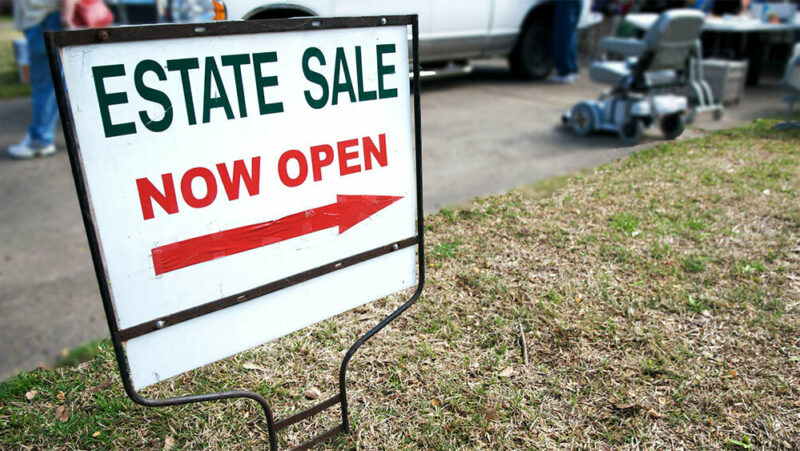Article Excerpt
Most people feel comfortable holding a yard sale. But an estate sale, which may take place over a two- or three-day period, is a much larger undertaking. Estate sales normally occur when someone has passed away – but they’re also useful when downsizing as an empty nester.
In most cases, the public is invited into the home and given the opportunity to purchase any item that has a price tag on it. Although, the coronavirus has forced some estate sales to move to Facebook marketplace, in a one-buyer-at-a-time format.

Photo credit: aetherestatesales.com
Estate Sale Considerations
Basic considerations for a successful estate sale include:
Timing. Planning an estate sale may take longer than you expect, so give yourself at least a month to prepare. When choosing a date, make sure it includes enough time to advertise and that it is a good date for your volunteers; you can't run the sale alone.
Inventory. Walk through your home and make a list of everything you will be selling, as well as what you want to keep. You'll have to go through every closet, drawer, cabinet, and even the attic and garage. Take photos of items you will want to feature in advertising. If you’re tech-savvy, you can make the list on a shared Google sheet. That way, family members can work on it simultaneously, in real-time.
Pricing. Emotional ties to items can make pricing difficult. Online research of similar items should help you set a realistic price. Keep in mind that estate sale shoppers are usually out for a deal. You may want to consider a separate auction for valuables and collectibles.
Advertising. The more places you advertise, the better. Craigslist and social media sites, such as Facebook Marketplace, are a great start. Add your listing to sites specifically for estate sales such as EstateSales.net. And lastly, during the event, use signage to capture the attention of anyone passing near the home. Don’t downplay the importance of traditional, “real-world” advertising for Saturday morning shoppers!
Organizing. Display items in the room where they are commonly used. For example, clothes, sheets, and blankets should be displayed on top of beds and dressers. Dinnerware should sit atop the dining room table. Position valuables close to the checkout so they aren’t easily stolen. You can also position your helpers around the home for added security.
Payment. Experienced estate sale shoppers usually come prepared with cash, so have change available. If you’re planning to sell high-priced items or simply want to encourage more sales by accepting credit cards, you can sign up for a free Square Reader to plug into your mobile device. Be aware that some card readers will incur fees.
COVID-19 Considerations. If you or your buyers are considering social distancing and minimal contact, estate sales can be more challenging. Create a Facebook Marketplace listing titled “estate sale.” List your items in a bulleted list in the description and update the description when items sell.

Photo credit: realtor.com
Estate Sale Professionals
You can host an estate sale by yourself. But if you’re pressed for time, or struggling with selling a deceased loved one’s possessions, you may want professional help. An estate agent doesn't have a personal attachment, and it's their job to know how much things are worth. Elder Options of Texas provides a list of questions you should ask when hiring an estate sale professional.

Photo credit: Charisse Kenion
One Couple’s Advice
One Central Texas couple, Cheryl and Richard, built a new lake home and wanted to sell just about everything in their current home. They decided to host their own estate sale.
“We had too many items for a garage sale, so it made more sense to keep it indoors, which also helped us limit the amount of people going in and out,” Cheryl said. “Plus, it allowed me to give the history of certain items so that the buyer would be excited about the purchase. It helped me to let go.”
They considered hiring an agent. But due to timing, cost, and their desire to be personally involved, they decided against it. Cheryl said they also enjoyed more profit by doing it themselves, but warns that not everyone has the “personality or drive” for such an undertaking.
She offers these tips: borrow long tables to display items, price items to the whole dollar to reduce the need for change, use Venmo for big items, don’t accept checks, and use a counterfeit detection pen for large bills.
She also recommends tips to finish strong. “On the last day, consider dropping prices. I think I did 25% off before noon and then 50% after lunch. Then contact local charities to schedule a pickup of any unsold items.”



